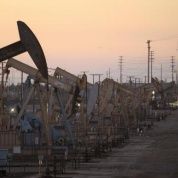International Monetary Fund Managing Director Christine Lagarde said that falling oil prices are a positive thing for the global economy as a whole. However, she added, that it may hurt individual commodity exporters. Lagarde sent a clear message to Iran, Venezuela, Nigeria and Russia, suggesting that those countries were going to face the consequences of significant revenue shortfalls while consumers in many importing countries are likely to pay less for various types of fuels.

The past months have seen oil prices fall in a dramatic way. One theory for why OPEC is allowing prices to fall is that the member countries and particularly its largest producer Saudi Arabia, are attempting to fight off competition from U.S. shale oil and maintain its share of the U.S. market.
However in an interview with teleSUR, the international analyst Alfredo Jalife explained one of his theories about how Saudi Arabia and the U.S. are trying to control world oil production and also defeat their oil-rich rivals in order to play what he describes as a “cynical geopolitical game.”
Professor Jalife argues that the approach made by Lagarde and several media outlets do not explain what is actually happening nor the rules of the world’s most important and complex geopolitical game.
The apparent winners of this level in the game are Saudi Arabia and the U.S., but also circumstantially China and India. This is because these oil exporters can bare the fall in prices since they have enough international reserves. However a bunch of producers whose economies are burdened by lack of oil revenue are affected directly.
The first example is Iran, whose reserves rank fourth largest in the world at approximately 157 billion barrels, the Persian nation has more than a century of experience in oil exploration and production. However since the Islamic Revolution in 1979 Iran’s economy has been languishing under international sanctions imposed over concerns about its nuclear program. The European Union has embargoed imports of Iranian oil since 2012, and the U.S. threatens to punish most buyers of the country’s crude.
Iran pumped 2.78 million barrels of oil a day in January, down from an average of 3.6 million in 2011, according to official figures. Despite its low production, Tehran controls a big part of the Strait of Hormuz, which is the only sea passage from the Persian Gulf to the open ocean and is one of the world’s most strategically important choke points. In this regard, Saudi Arabia will be very interested in destabilizing the Iranian government and thus removing the Islamic regime, its main enemy in the region. This move will allow the Saudis to control the strait along with Oman, which does not represent any risk for them. In this game Washington also wins with a strategic partner controlling the region.
The way to destabilize Iran would be through economic punishment inducing rampant inflation and an increase in unemployment, not to mention the effects on the currency. And even when current president Hassan Rouhani has tried to repair eight years of fiscal chaos under his predecessor Mahmoud Ahmadinejad, his attempts may be not successful due to the falling in oil prices, which could plunge the country back into deep recession.
The second example is Venezuela, whose reserves are recognized as the largest in the world, totaling 297 billion barrels. The country also leads Petrocaribe, an oil alliance of many Caribbean states that purchase oil on conditions of preferential payment.
Venezuela plays an role in the geopolitical game. Its socialist model has challenged the comfortable position held by U.S. economic interests for the better part of a century. After being elected president in 1998, Hugo Chavez changed the laws governing the country’s oil industry. The policy of Chavez has been to achieve “Full Sovereignty Over Oil,” a policy that stresses national control over the oil industry and a greater return from all oil endeavors operated on Venezuelan soil.
Chavez overturned the privatization of the state-owned oil company PDVSA, raising royalties for foreign firms and eventually doubling the country’s GDP. Those oil revenues were used to fund important social programs aimed at fostering human development in areas such as health, education, employment, housing, technology, culture, pensions, and access to safe drinking water.
The leadership of Caracas affects U.S. interests, in the Caribbean particularly, since it has undermined Washington’s policy of isolating Cuba. However this has never stopped Venezuela from showing its open and close relationship with Havana and also its brotherhood policy with the entire region.
The Venezuelan government is currently facing the consequences of these imperialist oil measures and the economic situation worsens since right-wing opposition leaders — supported by U.S. intelligence — incites protesters to violence and has been planning a coup against President Nicolas Maduro.
Pieces on the board
The main players in the crude oil market include the OPEC members Algeria, Angola, Ecuador, Iran, Iraq, Kuwait, Libya, Nigeria, Qatar, Saudi Arabia, United Emirates, Venezuela, U.S., Russia, and China. With also non-OPEC producers playing the game too, like the U.K. and Oman.
The U.S., Saudi Arabia and Russia are the biggest producers by a considerable margin, accounting for almost half of world crude oil production in 2014.
According to Alfredo Jalife, the impact of cheap oil will be devastating to most of the OPEC member countries, since supply and demand for current production is controlled only by the interests of two powers and they can’t wait for the price to rise. He added that today’s price reflects lower future demand and increased future supply.
The most predictable future are the alliances of allies in order to undermine the power of the Saudis and Americans. However professor Jalife says this could lead to a fierce and dangerous battle.
